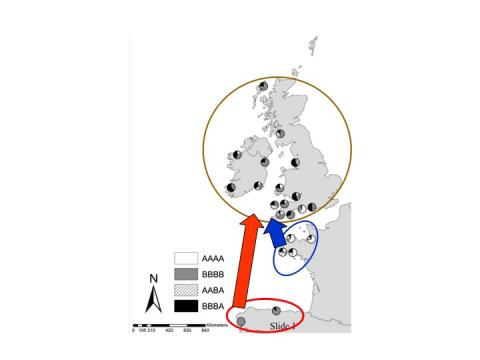You are here
Salmon of the British Isles originate from French and Spanish glacial refugial populations

In Europe, refugia in the Italian, Balkan and Iberian peninsulas are believed to be the main sources of species colonising northern Europe after the glacial retreat, however, there is increasing evidence of small, cryptic refugia existing north of these for many cold-tolerant species.
In a recent study published in the journal Heredity, we examined the glacial/post-glacial history of Atlantic salmon in Western Europe using two independent classes of molecular markers, microsatellites (nuclear) and mitochondrial DNA sequence data. Our findings confirm the existence of a glacial refuge in northern Spain and also highlight the existence of a previously unrecognized cryptic refuge in northwest France, containing fish with a ‘Baltic’ signature. Estimates of divergence times between salmon from these two refugia indicate that populations in these regions had already diverged a long time before the last glacial maximum; estimated divergence times ranged between 25,000–60,000 years before present, depending on the mitochondrial DNA evolution rate used.
Thus, previously glaciated areas of northwest Europe, i.e. Britain and Ireland, appear to have been colonised from salmon expanding out of both refugia, with the southwest of England being the primary contact zone and exhibiting the highest genetic diversity.
This paper is available on-line early at: http://www.nature.com/hdy/journal/vaop/ncurrent/full/hdy201317a.html
An article giving an overview of this work is available on the BBC Science and Environment web site:
http://www.bbc.co.uk/news/science-environment-22151865
- 16798 reads
The University of Exeter, The Queen's Drive, Exeter, Devon, UK EX4 4QJ
Copyright and Disclaimer


